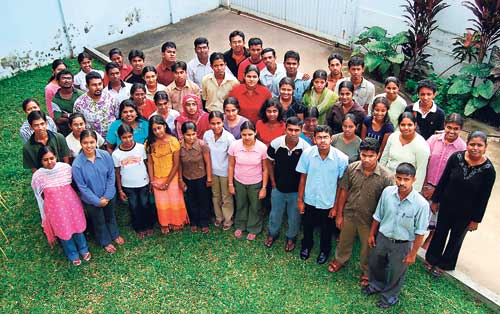
SLCJ: Setting journalists on path to professionalismThis week the fourth batch of trainees of the Sri Lanka College of Journalism (SLCJ) will receive their diploma certificates at the annual Award Ceremony at the Bandaranaike International Conference Hall in Colombo, marking another milestone in the development of journalism here. It is an oft repeated comment that journalists in Sri Lanka are not professional. There are reasons why that comment has been made.It is because most journalists in the past did not receive any formal training or did not have any journalistic education before they were permitted by their employers to practise the profession. “Any one off the street can become a journalist,” is the derisory statement that was sometimes heard.
This comment was one that resonated among top media professionals in Sri Lanka when they met at the BMICH in April 1998. At the meeting representatives from the profession, the owners and media managers signed the now famous “Colombo Declaration” which set out an agenda for Media and Social Responsibility. These key media actors also resolved to raise the professional standards of the media by setting up a self-regulatory body for the press and a college of journalism. Both these bodies would be administered by an institute. That was the genesis of the Sri Lanka Press Institute, the Press Complaints Commission of Sri Lanka and the Sri Lanka College of Journalism. All three institutions are co-funded by the governments of Sweden, Norway and Denmark. In the first phase of the SLCJ these governments provided 100% funding for the project. This phase has now ended and the funding only covers 70% of the expenses. The SLCJ also has partnerships with the World Bank Institute, UNICEF, UNDP, Transparency International and several foreign embassies for capacity building of journalists in Sri Lanka. The major educational partnership is with the University of Kalmar in Sweden and its Department for the Further Education of Journalists, fojo, one of Europe’s best known journalism teaching institutions. The Diploma Certificate for the SLCJ graduates is endorsed by the University of Kalmar and fojo. Starting in 2004, the SLCJ provided training only in the print media. From 2006, the diploma curriculum was expanded to cover both television and radio journalism with the installation of state-of-the art electronic equipment. All students receive basic journalism training. Subjects such as the Principles of Mass Communication, Media Law, History of Media are taught by university lecturers and professors from the Colombo and Sri Jayawardhanapura Universities. News writing, news values, ethics, Human Rights, Participatory Governance, Structures of government, Introduction to Politics, Crime reporting, Conflict reporting, Business Journalism and Sports are common subjects. English and computer skills such as Word, PowerPoint and other office programs are taught as part of the curriculum. Students specialising in print media also learn sub-editing and layout with QuarkXPress as the SLCJ is licensed to teach this universal newspaper software. The print students also study photography and photo editing with Adobe Photoshop. The SLCJ is equipped with modern digital cameras for this purpose. Radio students learn to record sound inside the SLCJ radio studios and also with portable professional news gathering equipment such as Edirols and Marantz recorders. They learn to edit sound with Adobe Cool edit and also SOA+, using non-linear computer based methods. Voice training and news reading are also part of their training. The television students are trained to be one-man units getting an all round training. They learn to operate a DV camera for news gathering, edit television visuals using linear editing suites as well as non-linear suites using Avid and Premier. Voice training, on camera presentation and studio techniques are part of their course. The media industry has expanded rapidly in the past few years particularly in radio and television. As a result most of the stations are facing a shortage of trained and experienced broadcasters. The main aim of the college is to produce industry-ready graduates who can fit into the newsrooms as soon as they move out of the college. More than 90% of the 170 students who have passed out of the college have found employment in media institutions. The batch receiving their diplomas on Friday has a total of 64 students and of them 58 are either already working in media institutions or have firm job offers. The SLCJ actively promotes multiculturalism and diversity as a policy. Therefore all field teams were compulsorily made up of students speaking different languages and from different media. The student body also celebrated all major religious and cultural events. For Hindu festivals they all went to a kovil, on Good Friday they were assigned to report from a Church and for Buddhist festivals they went to temple. For Eidh at the end of Ramazan, the students turned the college into a mosque and fed all the students and staff and visiting lecturers. For a Saraswati Pooja they turned the school into a kovil and all students participated. A dana was offered to seven Buddhist monks and lunch to the students and staff and the year was rounded off with a Christmas party. This promoted close relations between the different ethno-religious communities of the students and staff and also gave all the students an understanding of each other’s beliefs and culture which the college believes is essential for them to report in a multi-cultural and multi-religious society such as Sri Lanka. |
|
||||||
|| Front
Page | News | Editorial | Columns | Sports | Plus | Financial
Times | International | Mirror | TV
Times | Funday
Times || |
| |
Reproduction of articles permitted when used without any alterations to contents and the source. |
© Copyright
2008 | Wijeya
Newspapers Ltd.Colombo. Sri Lanka. All Rights Reserved. |
